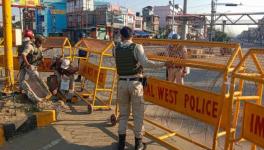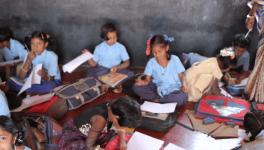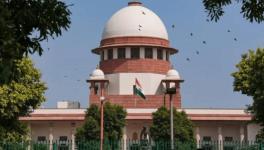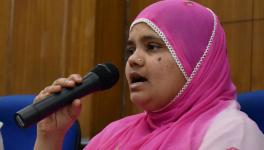Adivasis not Naxalites are the Target of the Government: Soni Sori
Soni Sori, the Adivasi woman leader who was tortured in custody in 2011 has become the face of the struggle for the Adivasi (indigenous) people of Bastar. She speaks to us of the struggle in Bastar, Chhatisgarh in this detailed interview that was originally in Hindi.
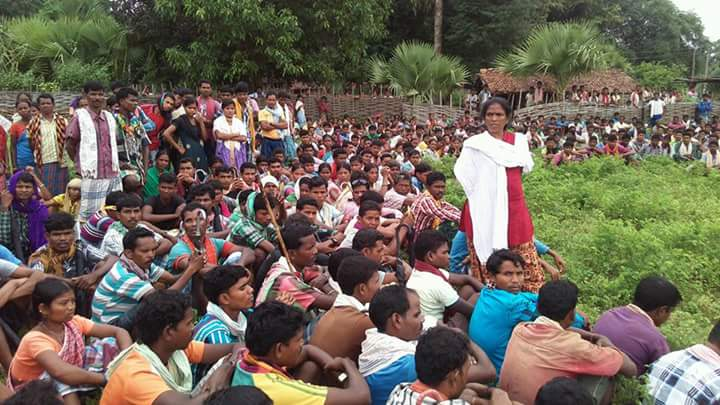
Question: The 2012 Nirbhaya rape case had a huge impact in Delhi, in fact on the whole of country. A year and a half before that you were subjected to a similar form of violence, the impact and the reaction was not the same on the country’s consciousness. What do you think is the reason?
Soni Sori: What happened to me, did resonate with many students, activists, intellectuals in the country and across the world. However even when all the facts were out, the country and its citizens did not react in the manner they reacted to the Nirbhaya case. The Nirbhaya case shook people across all sections of society. This did not happen with me, there are many reasons for this. If you just talk about Bastar, it’s not just me, many women have been subjected to all sorts of violence committed by Salwa Judum. Despite the magnitude of the violence only a few voices were raised. At the local level. Manish Kumjam was the only one.
Whenever there is violence in Bastar, it is reported as Maoist violence. This generalisation is why more than half of our country stays quiet and remains non-plussed in the face of violence committed on the local community of Bastar. If there is violence committed outside, to others, there is protest from the local community, but here the oppression is by the police; hence both other locals and journalists remain mute on the subject. The journalists are also oppressed here, look at what happened to Santosh Yadav.[1]
When there is any violence committed against Adivasis or villagers, then the people in the cities do not come out and protest. Urban populations never raise their voices in support of the rural population. It does not matter to city people what happens to Adivasis and rural citizens, they have no sympathy for people like us, that is for sure. Even in Bastar, if something happens to a non-Adivasi girl, the non-Adivasi population ensures that the city comes to a standstill. However if something happens to a girl in a village just a few kilometres from the town the police and local population make no noise.
Recently four women were raped in Pedagellur, an endless number of women have been subjected to sexual violence, the news was published in the papers, women and human rights organisations have raised an alarm and registered their protest, but this has had no impact on the population at large. However, I feel that local people should unite and show more courage, they should fight more, and they should raise their voices more strongly, only then will there be some change. Local people need to get together and make themselves heard, But outsiders need to respond and support the calls to action, as well.
Question: When you went to jail in October 2011, people in Delhi came to your support, many people sent letters and postcards. You once said that when I feel bad I take out one of these letters and read. With all this support, what did that time in jail mean to you?
Soni Sori: For a long time, while in jail I was ignorant of the support I was getting. Some human rights activists came to the jail to inform me of all the cards that had been sent to me. I had not received any. They spoke to the Jailor Madam. From then on, I received my letters. Before that I used to feel that I would die fighting inside the jail. I did not know my fight was being fought by many in the world outside. I thought my fight was confined to within the jail walls.
I found a lot of strength in those letters. One of those letters, unsigned, had the drawing of a parrot inside a cage but the beak was outside the cage, I would carry the letter around with me everywhere, including to court. My body might be locked up but not my voice. My voice can carry beyond the prison walls and I must raise it. Once I had access to these letters, I started fighting for more than myself. I became aware that I had a lot of support which others did not and I realised I must use that support to help others. Many letters with red salutes reached me. I wondered how these letters reached me, in tact, without any censorship. This made me feel that the people outside were stronger than the people in the jail, and this thought gave me strength.
Question: More than a year has passed since you got out of jail. What is the biggest issue today faced by the people of Bastar?
Soni Sori: The biggest problem nowadays is the illegal encounters, killings, unlawful arrests and detention of Adivasi and rural men and women. The other thing I’m worried about in Bastar is that the children just don’t get proper education. There is no livelihood for them. Adivasis are not able to farm and there is a lot of fear. There is fear in the morning, fear in the night. Everybody fears for their life, they are scared 24/7, they are scared to go to the market and they are scared of the police force. The fear of the police is the pervasive fear here and the biggest concern for me. We are scared that the police might come and arrest any of us anytime. No one is free in Bastar.
Question: Since the new government came to power last year, do you think detainees are being more oppressed? After all new officers, such as a SRP Kalluri, came in with the new government, since then the police claims Maoists have lost their steam. A report states that in the month of November only there were 18 successful encounters. Can you tell us what exactly is happening there?
Soni Sori: Please understand one simple thing, the government is not killing Maoists, the government is killing Adivasis. After all, all the people that were killed here and those who left their villages during the oppression of Salwa Judum were Adivasis, who else? Now the reports on Salwa Judum are all out in the open. But at that point in time, the government claimed it had burned Maoist strongholds, rather than Adivasi villages. It is the same today. If you conduct an impartial investigations it will be clear that the people who are being arrested or killed in encounters or have surrendered, are primarily Adivasis and not Maoists. In all probability, the numbers of Maoists has only increased in the area, and only ordinary Adivasis have died. This phenomenon has grown in the last year.
Question: Recently you have been very vocal about encounters. You and your supporters have been threatened. The IG in Bastar has refuted your allegations. Can you talk a little more about the issue you are raising?
Soni Sori: In recent times, I’ve only spoken out about encounters in rural areas conducted by the government forces. The IG can say whatever he wants. My stand is that a fair and impartial investigation should be done, you’ll find all the answers there. Whenever I have picked up any victim’s case, I have brought to light who they actually were, their family, their home, where they lived, their voter ID (identity) card; I have clarified the identities of these people and brought the proofs to government offices from the SP, up to the IG.The people who have been killed are primarily farmers and not Maoists. The government needs to prove how it came to the conclusion that these people were Maoists, the government needs to answer, what weapons did they have ? The government here just gives out awards, I need proof (s).
In one case, the police killed Bemanopu in Revali village. When his wife Budri went to the police station, the police mentioned in the FIR that Bema was killed by Naxals. There was a huge rally and demonstrations organised by the villagers in Bastar in reaction to the killing. Despite protests, the police stood its ground claiming the Maoists had killed Bema. After a few months, the Maoists released a pamphlet which read Comrade Bemanoppu, Red Salute. Now the police claim Bemanoppu was a Maoist! So a man who is given a red salute, he automatically becomes a Maoist? If anyone says 'Lal Salaam/Red Salute', that makes him a Maoist? That is how the police are here in Chhatisgarh, they label everybody a Maoist.
My father was shot in the leg by Maoists and yet the police call me a Maoist. I’m the daughter of a farmer, I was a school teacher. In all cases except one I have got an honourable discharge. The Supreme Court has also ruled that there is no case against me, which is why I am out on bail. Even after this long fight, and vindication, this government, the police and many people continue to propagate that I am a Maoist. Why? Because I bring out the truth about atrocities faced by my people and because I will not be silenced?
Question: Since you have come out of jail, there is a new wave of protest in the area. Many people are coming out into the open, organising rallies, sometimes with you, sometimes on their own. Are you hopeful about this?
Soni Sori: Yes, I’m hopeful about the way villagers are coming out to protest these days. The important thing to remember is, that today both the police and the Maoists have weapons. We don’t. We are fighting for peace. People are increasingly feeling that if they continue with a non-violent protest, something will change. I’m noticing that a new faith is growing among our people. When people come out to the rallies or to protest outside the jails, sometimes with me, and sometimes without me, I feel very empowered. All that I want right now is for the people of Bastar district to come together. Let it be under any party banner or under any leader; the focus must be beyond religion, caste and tribe; we also want to take the discourse beyond the Naxals versus government. Our voice must be heard, must be central to the discourse. There must be this third way that will speak for our people, the people of Bastar and this path must be led by them. Our samaj has started discussing this critical issue: how putting politics aside, can we find social solutions to better our condition?
I’m increasingly feeling that people in Bastar have now decided that they will raise their voice even if nobody chooses to listen to them. We are increasingly feeling that something will work out sooner or later for us. It is sad that the British have left the country but our own countrymen have turned into the colonisers, perhaps even worse than the British were.
Question: How should sustained interest in your campaign be maintained?
Soni Sori: Protest is growing more and more. From village to village, from small rallies to large demonstrations, from the district level to the (felega) division. This fight will grow, enriched by the experience of the fight on the ground. The more we fight on the ground the more the movement will expand. As we articulate our experiences, bitter as they are, being tortured, (police said Dbangta Bud), the more people will join.
Question: How did your life changed after going to Jail?
Soni Sori: It changed a lot. Before going to jail, my universe was limited to my kids, my husband and my job. Everything has changed now, earlier I used to think, I should earn for my children and educate them; but now I realise my kids are of course my responsibility but this fight is also very important.
After my experiences in the jail, my view of life changed and this change did not come through any books but from within, from the lived experience. After witnessing injustice in the jail, after talking to people in prison about their experiences, my world view changed. The ideas that changed my world view are ingrained in me, they run through my veins now.
Now my children, my family and this struggle, all need to go hand in hand. All of them are as important to me. I am still the same person as I was before but now my thoughts have changed. Earlier I used to be simple, naive and was afraid but today I am fearless. Earlier I used to aspire to have a simple family life but today I want to fight for my people. Earlier I used to have one home, now the whole place is my abode.
Question: You have gone through more than your share of trouble. During your stay in the jail or after coming out of it, did quitting everything and starting over something different cross your mind?
Soni Sori: During my time in the jail, the kind of support I got from outside and the kind of expectations people had from me from inside the jail never allowed any thought(s) of quitting cross my mind. The injustice I went through, or other inmates went through, made me more determined.
Generally, when someone from the jail gets released the other inmates feel jealous and they ask, when will they be able to come out? But I still remember, the day before my release, all the women in the jail managed to make sweets and distributed these to everybody. These kinds of things were never allowed before. They also asked for special permission from the jailor to come and talk to me freely and the jailor permitted them to do so. The day I was released from the jail, everyone was happy, not only for me but for themselves as well. They bestowed their hopes upon me, believing that I will continue their fight after my release. I still remember that day very clearly. The thought of quitting never crossed my mind even while I was in the jail.
But once I came out and fought elections, my financial situation deteriorated. It is still not good. I started thinking about my three children. If I do not think of them, if I neglect their education their lives will also be full of struggle. During these times I have sometimes thought of quitting, wanting to to just focus on my children, as their father is also no more. Whenever I felt like this, I have had a frank discussion with all three of them, my children. They have asked me to just not think about them. They said to me, “So many people come to you with hope that you will fight for them, please do not disappoint them for us”. My children are my great support. They are like my friends now.
Question: In the face of such adversity, where do you find your courage?
Soni Sori: I get lots of support from my children. They understand I am not able to give them as much time as a normal mother should give, but they never complain. Sometimes I keep traveling for days from one rally to another but my children never ask me to me come back before my work is done. They do not demand attention. They understand me well.
Sometimes in schools their class mates tease them and some even taunt them saying that “your mother is a Naxalite and a murderer”. It is at such times that I get tense and worked up. But then my children, again, re-assure me and say that they do understand what I am fighting for and that they are in it (the struggle) with me. From them, I get lots of courage and support. Many times when I am not in the house the police come and search my house in front of the kids, they asks all sorts of questions to my children. But my children are fearless.
The cause itself has become a part of me. It is now ingrained in me. Whenever I get information about some incident I just can’t stop myself from going there. It does not matter what time of the day it is; I just go. When I do not have money to travel, I ask for the money from my friends but I somehow reach the place where I have to go.
Many time officers and bureaucrats offer me money, a car or a house. Taking these favours might secure my children’s future. But I refuse to fall into their trap. Truth is the ultimate source of my courage. The truth that resides in me, I will never let it die. This truth for me is the most precious thing.
I have gone through a lot. I was tortured, electrocuted. My body has gone through lots of suffering. I lost my husband to the hands of injustice. When I think of those days, I do get angry. And this anger consumes all the fear I have ever had. This anger gives me courage to fight on. I see myself getting involved in other people’s struggle. I do not know if I can get them justice, but I will make sure their stories of suffering will be heard outside. Their stories will be spread. And that is my aim.
Question: Soni Sori, the leader, the fighter, the activist, the mother, how different is she?
Soni Sori: I cannot separate myself from the cause, or my children. Whatever I have or whatever I am, is all here. If I take away the fight from my life, I will be very lonely. They tortured and killed my husband. Even today, Ankit Garg who committed all those atrocities on me, is walking free. I still have not got justice. When I think of these things I get really angry.
I feel that my husband is still with me. I try not to keep anything, which reminds me of his death. I do not keep any photographs or other things, which might remind me of him. But sometimes I think of him and I wonder how my life has changed.
Question: What is a typical day you? Do you like to do in your spare time?
Soni Sori: I spend my spare time with my children, the cook has left long ago, and the household work is not too much. When I'm at home with them we share the house work together, prepare the food, eat, have fun, and talk of this or that; about my work, about their school, their friends. Sometimes we go to visit my father in the village.While in jail where nothing was happening, I got the feeling the day was never-ending, now I feel each day ends so quickly because I’m barely home. I’m either in the field or out on some work. I hardly get seven days in the month when I can be at home all day.
Question: What can the non-tribal, the non-Adivasi learn from tribal communities?
Soni Sori: Among other things, dowry is a big issue in this country. The whole world knows about it and talks about it. It brings shame to our country. In tribal communities there are no such practice. If the husband is violent towards his wife, then the whole village gets together and tries to make him change his behaviour. If the girl does not want to stay with him, so it’s her decision. People don’t have any specific wish to have male children. We tribals, look forward to the birth of a girl child.
One of the most important things that can be learned by others from us, is our unity. If a child is born in a family the whole community looks after the child. The child belongs to everyone in the community. If anyone of us is facing any kind of problem or injustice the whole community unites for her (him). We fight for him/her together. Even though we sometimes live far apart from each other, we still worry and care for him/her. If anyone of us needs money the whole village comes together to help him/her. This is ingrained in our culture.
But things are changing now. This struggle and interference from the police is slowly affecting our cultural values. I still remember, as a child, during our holidays we used to finish our daily chores as early as possible. Then at night, under the bright moon light, we used to dance and sing, all night long. Men and women, girls and boys all danced together. People used to fall in love at those gatherings. But now all those things don’t happen anymore. Now we do not celebrate many Adivasi festivals any more. Earlier we use to grow many different kind of crops but these days we just focus on wheat and paddy. The things we celebrated together are not part of our daily celebrations.. The police do not allow any kind of meeting. All kinds of meetings are branded as Naxalite meetings! People have just stopped dancing and singing at nights. Even during the day the villagers are scared of meetings.
After the Sarkeguda incident, targeting people, the people are just afraid of meetings and gatherings. [2]
Question: And in all this women are the most affected?
Soni Sori: Yes, out of fear from the police, men have stopped going out of the house. Now all the work has been bestowed on the women of the family. Sowing and harvesting, going to the forest for firewood, going to the market to sell products and all the house hold chores are now done by the women of the family. Women also have to face more atrocities from the police. As men are arrested in higher numbers, they run away when the police forces descend on the village. Only the women stay back. These women are then harassed, beaten up and also molested, many times over, by the police. Recently, many such incidents have taken place, for example at Pedagellur and in the nearby villages in Bijapur. What happened in Pedagellur is really shameful.[3] These kinds of incidents used to earlier happen during the Salwa Judum days. The police has become more shameless now and fearless too, over last year.
And because of all this men are becoming alcoholics and women have to face even more problems.
Question: What is your favourite song or story?
Soni Sori: I love our tribal dance songs about the earth. I don’t get to hear them that often, nowadays. There is a film that I remembered, when I went through all those trials and went to jail, I remembered that film, Bandit Queen. After seeing that film I thought that such a violent predicament was a thing of the past. But with my experience, and when I heard about torture and violence happening to others too, then that film came to my mind again.
Question: Is there anything specific or special you wish to tell people, in India, abroad?
Soni Sori: As always, I simply want to say that there is a lot is happening here in Bastar, and not much of it is reported in the news. So, just as people fought for me, so must the grievances of all those people being held in prisons, killed in encounters, suffering under police repression here, be voiced.
People must come here to bear witness and support these protests. Especially for those who are in prisons, fellow brothers and sisters, citizens, help is needed to prove their innocence. I'm sure if we all do something together we will live to see the day when all these people will be released from prison. But all this change has to be accompanied by a change in the government’s way of dealing with the situation in Bastar.
The government claims it wants to put an end to Maoists but rather than fighting Maoists the government clearly seeks to remove tribals from their land. There is only one end to this war, either the tribals will win or the government will. Let’s see. Us tribals, we Adivasis, we have a lot of strength, we will fight. The government will not necessarily win so easily.
(The interview, collectively drafted with-co editor Teesta Setalvad was conducted by Isha Khandelwal, advocate with the Jagdalpur Legal Aid Group, a lawyers collective working in Bastar, Chattisgarh since July 2013. The collective provides free legal aid to the adivasis of the region raising issues of false incarceration , illegal detention, custodial torture and fake encounters. The original Hindi version was edited by Mayank Saxena. The translation from the Hindi is the work of Kate Chaillat, Rukmimi Sen and Samrat Mukherjee)
[1] Bastar journalist in jail without chargesheet, family seeks answers, http://indianexpress.com/article/india/india-news-india/bastar-journalis...
[2] Bloodbath at Sarkeguda, http://mainstreamweekly.net/article3576.html
[3] Security forces faces investigation, Chilling incidents of rape in Chhatisgarh, http://archives.scroll.in/article/770330/security-forces-face-police-inv...
Courtesy: sabrangindia.in
Get the latest reports & analysis with people's perspective on Protests, movements & deep analytical videos, discussions of the current affairs in your Telegram app. Subscribe to NewsClick's Telegram channel & get Real-Time updates on stories, as they get published on our website.










